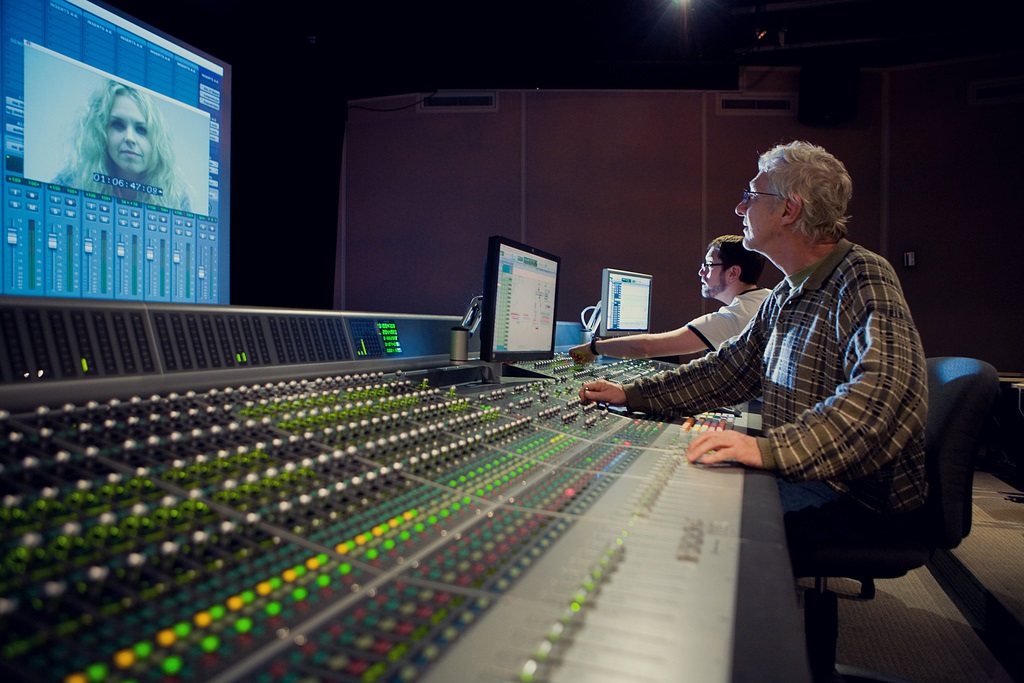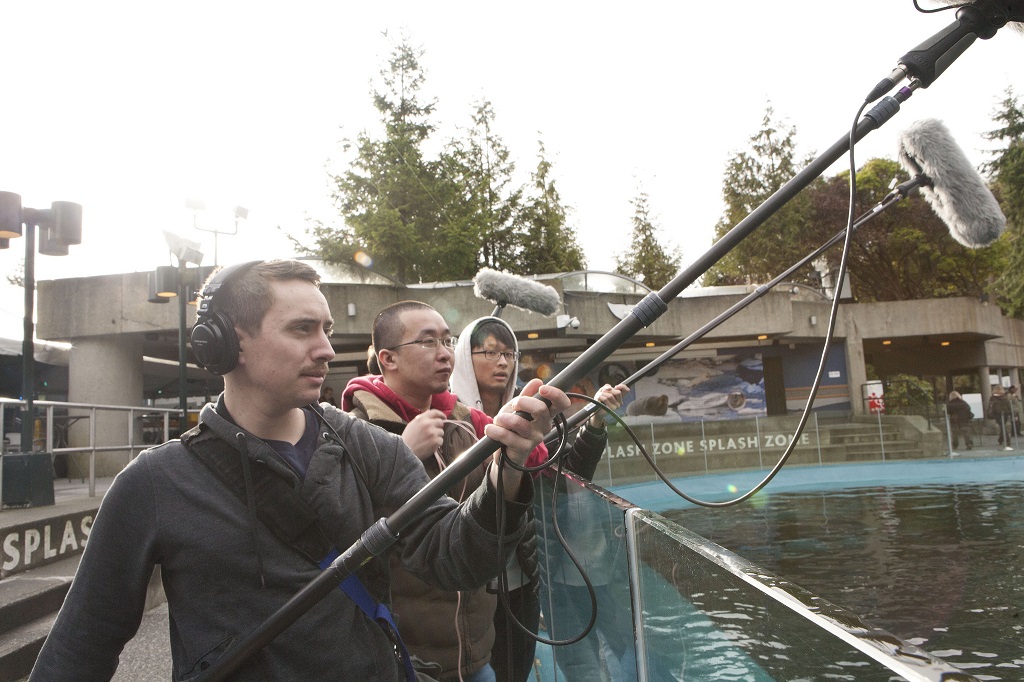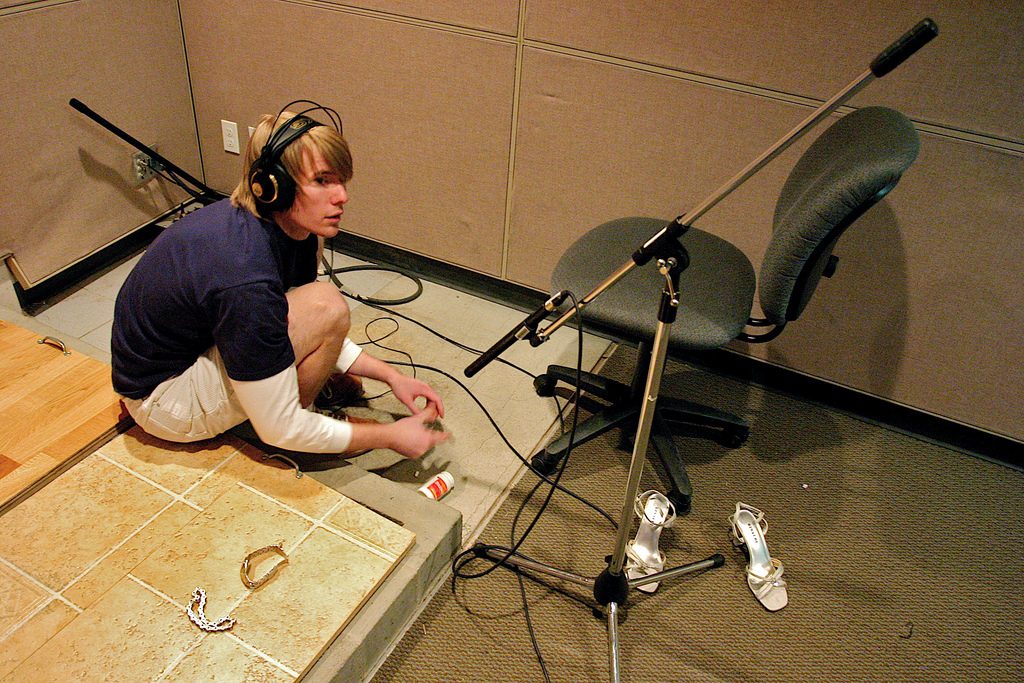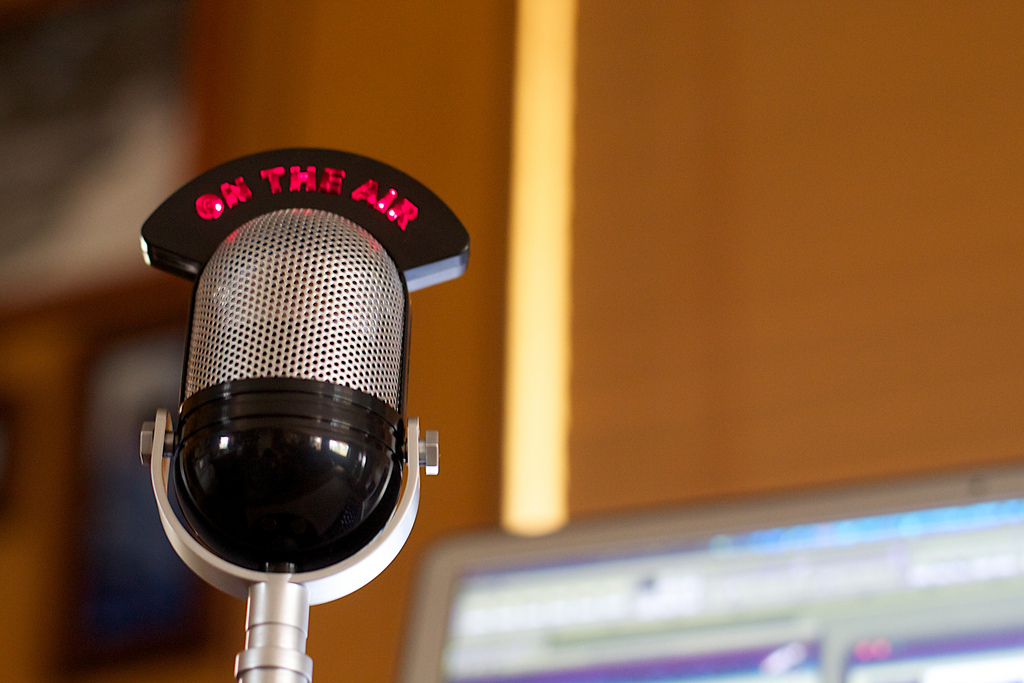Zoo professions related to the audio industry
Earlier, we talked about what you need to know before you start a career in the music industry. Today we will conduct a brief overview of the professions encountered in the process of working with sound. Each of these professions has its own nuances associated with specialization.

Photo of Vancouver Film School / CC BY
Each song or composition - the result of creativity. As a rule, in the process of creating his work, the author loses important external reference points. Therefore, the final material can be compared with the draft of the novel. The first thing to do in order to turn a draft into a book is to find an editor who will look at the material from the outside and give it a rating.
This role is performed by the producer. Depending on the professional goals and existing agreements with the musician, the role of the producer is transformed. On his shoulders can lie everything from the choice of a studio to record and control creative decisions made in the process of work, to the selection of additional staff and promotion of the final product.
Most of the producers are personally involved in arranging and mixing, although they can delegate some of these responsibilities to their colleagues. If we talk about recording in the studio, then this is a team of engineers. They help with the placement of microphones, work with equipment and manage the technical aspects of recording. When all instruments are satisfactorily recorded, the junior sound producer is involved. If necessary, his role can be performed by the engineer who conducted the recording, or the producer himself. Younger sound engineer level the drum part, synchronize vocal tracks, cut out unnecessary sounds and correct vocals.
After the session is put in order, it is ready to note. This is the job of either the producer himself or the hiring engineer he hired. The main task of such a specialist is to resolve sound conflicts between different instruments, and bring the sound image to a view that reflects the creative vision of the producer.
To make the end result sound decent, note engineers often work with acoustics that accentuate problematic parts of the spectrum. A similar task is with the concert sound engineers, but the practical skills required for such work are completely different. A good studio engineer can be a mediocre concert engineer, and vice versa.
When the desired sound of the composition is reached, the stereo mix is sent to the master engineer. His task is to adapt the song so that it sounds good both on the car audio system, on notebook speakers, and on home acoustics. However, it is not always possible to reach a compromise sound.
In the cinema, specialists work both in studios and on the set. A sound engineer and a microphone speaker take part in the shooting: the first follows the recording levels and controls the mixer, the second is responsible for the equipment, holds the microphones, fixes the buttonholes on the actors. In the studios sound engineers, composers, noise artists, voice actors are responsible for the sound.

Photo of Vancouver Film School / CC BY
The sound in commercial cinema consists of hundreds of tracks that can be divided into three main categories - music, special effects and speech. Seemingly incompatible sounds are often superimposed on each other — for example, the sound of a violin and the sound of an explosion. Therefore, tracking all conflicting frequencies is extremely difficult. The sound engineer needs to combine them in such a way that everything sounds organic. Also, we must not forget that the cinema sound exists in close conjunction with the video series, and should complement it, revealing the history of the motion picture.
It is not enough just to use audio from the site. The sword, taken from the scabbard, in fact, has no ringing clank, and the ladybird sits on a leaf absolutely silently. In order for these things to sound like we represent them, you need to record or find such sounds, and integrate them into the picture. This is what the noise collectors do .

Photos of Vancouver Film School / CC BY
Film dubbing is also not an easy process . The shooting conditions do not always allow recording the voices of actors directly on the set. In such cases, the speech component is recorded in the studio. It happens that the director is not satisfied with the voice or the accent of the actors. Then they invite a voice actor to become a new voice.character.
The main activity of voice actors is simultaneous translation or dubbing. In simultaneous translations, a new sound track is superimposed over the original audio in order to convey the meaning of what has been said and to preserve the possibility to hear the original, more emotional presentation. In the dubbing speech of the actors, who initially voiced the film, is completely replaced by the translation, and the voice actor needs to fully get into the role.
To voice a film in another language, it is not enough just to translate the text: you need to edit it and adjust it to the length of the original cues and the facial expressions of the actors. This is done by translation editors and handlers (in more detail about them, as well as the phenomenon of "nasal" translations in the 80s and 90s, we told earlier ).
In games, two categories of people are responsible for sound - audio designers who directly create sounds and audio programmers who “populate” the game world with these sounds. Some journalists jokingly call AAA games "interactive cinema", but they are not far from the truth. Games with a large budget are voiced in professional studios. Cinema noise makers create effects, and soundtracks to such games are often written by film composers.
If we talk about the organizational component of the process of creating sound design for games, then the work related to the “dot” audio design is often given to freelancing . It also happens that orders are limited to creating a specific effect, for example, an explosion. Also, freelancers are given to edit the dialogues, test sounds, embed them into the game.
With this help audioprogrammers. They focus on sound positioning and developing tools for other programmers. While in music and cinema the spatial position is fixed to sounds, in games you can change your position relative to their sources. Depending on the environment in which the game takes place, the obstacles in the way and the characteristics of the character itself, the same sound may sound completely different.
Radio music radio consists of music, DJ remarks, advertising, news blocks and jingles connecting these elements. Most often on the radio work sound engineer, music editor, program director, producer of the air, correspondents and DJs.
The sound engineer controls the volume, processes the music before it is broadcast and maintains the audio equipment in working condition. He often writes jingles and musical underlays (although sometimes this work is given to freelancing).
The task of the radio station’s music editor is to create a broadcasting schedule so that it has no empty seats, plans for advertising, news and tracks played, and all programs are scheduled. He is helped in this by special programs that create playlists, compile tracks for compatibility and set the frequency of their broadcasting. Each track must be approved by the program director and producer of the broadcast.

Photo by Alan Levine / CC BY. The
main task of the DJ is to prevent silence.in between songs, jingles and other components of the radio. Silence may occur due to the fact that there are pieces unregulated in length in the broadcasting schedule - for example, a news release may turn out to be shorter than planned, and it is important to fill in the resulting “window” with something.
Designing acoustics is a special process that requires both good hearing and serious knowledge in the field of physics. The task of such engineers is to create a product with the sound characteristics specified in the specification, having complied with a certain budget.
Creating acoustics is always a compromise, because the components of the speakers themselves introduce distortions. It is important to choose such a “set” of these distortions so that together they sound beautiful and fit a certain category of listeners.
However, acoustics and its handwriting become obsolete with time: the sound that was popular, for example, in the early 90s, is not relevant now. Engineers need to understand what is happening in the industry, what are the preferences of the current generation of customers, and modernize the old schemes in accordance with the new trends and desires.
More about the professions related to sound, talk in our Telegram-channel:
 What you need to know before you start a career in the audio industry
What you need to know before you start a career in the audio industry
 Traditions of Soviet dubbing
Traditions of Soviet dubbing
 The very voice of the 90s
The very voice of the 90s

Photo of Vancouver Film School / CC BY
Music industry
Each song or composition - the result of creativity. As a rule, in the process of creating his work, the author loses important external reference points. Therefore, the final material can be compared with the draft of the novel. The first thing to do in order to turn a draft into a book is to find an editor who will look at the material from the outside and give it a rating.
This role is performed by the producer. Depending on the professional goals and existing agreements with the musician, the role of the producer is transformed. On his shoulders can lie everything from the choice of a studio to record and control creative decisions made in the process of work, to the selection of additional staff and promotion of the final product.
The number of people working on one record depends, including on the genre. Last year's Eminem album was prepared by 15 people, and in electronic and experimental music there are often people who do everything alone from beginning to end.
Most of the producers are personally involved in arranging and mixing, although they can delegate some of these responsibilities to their colleagues. If we talk about recording in the studio, then this is a team of engineers. They help with the placement of microphones, work with equipment and manage the technical aspects of recording. When all instruments are satisfactorily recorded, the junior sound producer is involved. If necessary, his role can be performed by the engineer who conducted the recording, or the producer himself. Younger sound engineer level the drum part, synchronize vocal tracks, cut out unnecessary sounds and correct vocals.
After the session is put in order, it is ready to note. This is the job of either the producer himself or the hiring engineer he hired. The main task of such a specialist is to resolve sound conflicts between different instruments, and bring the sound image to a view that reflects the creative vision of the producer.
To make the end result sound decent, note engineers often work with acoustics that accentuate problematic parts of the spectrum. A similar task is with the concert sound engineers, but the practical skills required for such work are completely different. A good studio engineer can be a mediocre concert engineer, and vice versa.
When the desired sound of the composition is reached, the stereo mix is sent to the master engineer. His task is to adapt the song so that it sounds good both on the car audio system, on notebook speakers, and on home acoustics. However, it is not always possible to reach a compromise sound.
One of the most famous examples of unsuccessful mastering is the album Death Magnetic, released by the group Metallica in 2008. The analysis showed that many of the errors that led to this result arose even at the mixing stage. Dissatisfied fans organized a petition asking the band to re-release the album, but unfortunately it did not lead to anything.
Film industry
In the cinema, specialists work both in studios and on the set. A sound engineer and a microphone speaker take part in the shooting: the first follows the recording levels and controls the mixer, the second is responsible for the equipment, holds the microphones, fixes the buttonholes on the actors. In the studios sound engineers, composers, noise artists, voice actors are responsible for the sound.

Photo of Vancouver Film School / CC BY
The sound in commercial cinema consists of hundreds of tracks that can be divided into three main categories - music, special effects and speech. Seemingly incompatible sounds are often superimposed on each other — for example, the sound of a violin and the sound of an explosion. Therefore, tracking all conflicting frequencies is extremely difficult. The sound engineer needs to combine them in such a way that everything sounds organic. Also, we must not forget that the cinema sound exists in close conjunction with the video series, and should complement it, revealing the history of the motion picture.
It is not enough just to use audio from the site. The sword, taken from the scabbard, in fact, has no ringing clank, and the ladybird sits on a leaf absolutely silently. In order for these things to sound like we represent them, you need to record or find such sounds, and integrate them into the picture. This is what the noise collectors do .

Photos of Vancouver Film School / CC BY
Film dubbing is also not an easy process . The shooting conditions do not always allow recording the voices of actors directly on the set. In such cases, the speech component is recorded in the studio. It happens that the director is not satisfied with the voice or the accent of the actors. Then they invite a voice actor to become a new voice.character.
The main activity of voice actors is simultaneous translation or dubbing. In simultaneous translations, a new sound track is superimposed over the original audio in order to convey the meaning of what has been said and to preserve the possibility to hear the original, more emotional presentation. In the dubbing speech of the actors, who initially voiced the film, is completely replaced by the translation, and the voice actor needs to fully get into the role.
To voice a film in another language, it is not enough just to translate the text: you need to edit it and adjust it to the length of the original cues and the facial expressions of the actors. This is done by translation editors and handlers (in more detail about them, as well as the phenomenon of "nasal" translations in the 80s and 90s, we told earlier ).
Video game industry
In games, two categories of people are responsible for sound - audio designers who directly create sounds and audio programmers who “populate” the game world with these sounds. Some journalists jokingly call AAA games "interactive cinema", but they are not far from the truth. Games with a large budget are voiced in professional studios. Cinema noise makers create effects, and soundtracks to such games are often written by film composers.
Of course, the soundtrack of games has a very similar role: to create an atmosphere, tell a story, emphasize the idea of developers and directors. But he has his own peculiarities. Unlike cinema, where only an emotional reaction is expected from the viewer, games require decision-making. This fundamentally changes the final product and the process of its design - “decorative” sounds should fade into the background at the right moments, giving way to an informative one.
If we talk about the organizational component of the process of creating sound design for games, then the work related to the “dot” audio design is often given to freelancing . It also happens that orders are limited to creating a specific effect, for example, an explosion. Also, freelancers are given to edit the dialogues, test sounds, embed them into the game.
With this help audioprogrammers. They focus on sound positioning and developing tools for other programmers. While in music and cinema the spatial position is fixed to sounds, in games you can change your position relative to their sources. Depending on the environment in which the game takes place, the obstacles in the way and the characteristics of the character itself, the same sound may sound completely different.
Radio
Radio music radio consists of music, DJ remarks, advertising, news blocks and jingles connecting these elements. Most often on the radio work sound engineer, music editor, program director, producer of the air, correspondents and DJs.
The sound engineer controls the volume, processes the music before it is broadcast and maintains the audio equipment in working condition. He often writes jingles and musical underlays (although sometimes this work is given to freelancing).
The task of the radio station’s music editor is to create a broadcasting schedule so that it has no empty seats, plans for advertising, news and tracks played, and all programs are scheduled. He is helped in this by special programs that create playlists, compile tracks for compatibility and set the frequency of their broadcasting. Each track must be approved by the program director and producer of the broadcast.

Photo by Alan Levine / CC BY. The
main task of the DJ is to prevent silence.in between songs, jingles and other components of the radio. Silence may occur due to the fact that there are pieces unregulated in length in the broadcasting schedule - for example, a news release may turn out to be shorter than planned, and it is important to fill in the resulting “window” with something.
Creating acoustics
Designing acoustics is a special process that requires both good hearing and serious knowledge in the field of physics. The task of such engineers is to create a product with the sound characteristics specified in the specification, having complied with a certain budget.
A unique acoustic style of acoustics is formed precisely by engineers: they prescribe the device circuit, select the necessary components, design the case for it.
Creating acoustics is always a compromise, because the components of the speakers themselves introduce distortions. It is important to choose such a “set” of these distortions so that together they sound beautiful and fit a certain category of listeners.
However, acoustics and its handwriting become obsolete with time: the sound that was popular, for example, in the early 90s, is not relevant now. Engineers need to understand what is happening in the industry, what are the preferences of the current generation of customers, and modernize the old schemes in accordance with the new trends and desires.
More about the professions related to sound, talk in our Telegram-channel:
 What you need to know before you start a career in the audio industry
What you need to know before you start a career in the audio industry  Traditions of Soviet dubbing
Traditions of Soviet dubbing  The very voice of the 90s
The very voice of the 90s